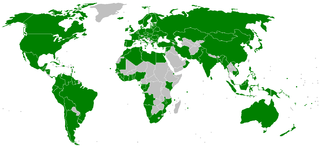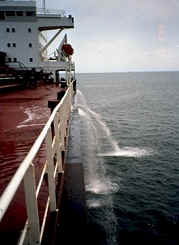
Maritime transport, fluvial transport, or more generally waterborne transport is the transport of people (passengers) or goods (cargo) via waterways. Freight transport by sea has been widely used throughout recorded history. The advent of aviation has diminished the importance of sea travel for passengers, though it is still popular for short trips and pleasure cruises. Transport by water is cheaper than transport by air, despite fluctuating exchange rates and a fee placed on top of freighting charges for carrier companies known as the currency adjustment factor (CAF).

The International Convention for the Prevention of Pollution from Ships, 1973 as modified by the Protocol of 1978 is one of the most important international marine environmental conventions. It was developed by the International Maritime Organization in an effort to minimize pollution of the oceans and seas, including dumping, oil and air pollution. The objective of this convention is to preserve the marine environment in an attempt to completely eliminate pollution by oil and other harmful substances and to minimize accidental spillage of such substances.

The Port of Hong Kong, located by the South China Sea, is a deepwater seaport dominated by trade in containerised manufactured products, and to a lesser extent raw materials and passengers. A key factor in the economic development of Hong Kong, the natural shelter and deep waters of Victoria Harbour provide ideal conditions for berthing and the handling of all types of vessels. It is one of the busiest ports in the world, in the three categories of shipping movements, cargo handled and passengers carried.
The International Convention for the Safety of Life at Sea (SOLAS) is an international maritime treaty which sets minimum safety standards in the construction, equipment and operation of merchant ships. The convention requires signatory flag states to ensure that ships flagged by them comply with at least these standards.

The World Maritime University(WMU) in Malmö, Sweden, is a postgraduate maritime university founded by the International Maritime Organization (IMO), a specialized agency of the United Nations. Established by an IMO Assembly Resolution in 1983, the aim of WMU is to further enhance the objectives and goals of IMO and IMO member states around the world through education, research, and capacity building to ensure safe, secure, and efficient shipping on clean oceans.
A Marine surveyor is a person who conducts inspections, surveys or examinations of marine vessels to assess, monitor and report on their condition and the products on them, as well as inspects damage caused to both vessels and cargo. Marine surveyors also inspect equipment intended for new or existing vessels to ensure compliance with various standards or specifications. Marine surveys typically include the structure, machinery and equipment and general condition of a vessel and/or cargo. It also includes judging materials on board and their condition. Because certifications and subsequently payments are processed only after the surveyor has expressed his or her satisfaction, a marine surveyor holds a prestigious position and is held with much regard in the shipbuilding industry. Marine Surveyors are highly qualified and technically sound and are usually selected after thorough evaluation procedures as vessels ranging from small ferries to enormous crude oil carriers and cruise liners are approved to sail into the high seas based purely on their judgment, competence and integrity.
The International Association of Classification Societie's (IACS) is a technically based non-governmental organization that currently consists of twelve member marine classification societies. More than 90% of the world's cargo-carrying ships’ tonnage is covered by the classification standards set by member societies of IACS.
Sector Commander is the position title of the commanding officer of a United States Coast Guard Sector, usually of the rank of Captain (O-6). The Sector Commander's second-in-command is the Deputy Sector Commander. Also reporting directly to the Sector Commander are the Command Master Chief (CMC), the Senior Reserve Officer, and the Sector's Auxiliary Coordinator.

In 1961 China established a state-run maritime shipping company and subsequently signed shipping agreements with many countries, laying the foundation for developing the country's ocean transport. That organization developed into the present-day China Ocean Shipping (Group) Company (COSCO). The Chinese government also invested heavily in water transport infrastructure, constructing new ports and rebuilding and enlarging older facilities.
Net register tonnage is a ship's cargo volume capacity expressed in "register tons", one of which equals to a volume of 100 cubic feet (2.83 m3). It is calculated by subtracting non-revenue-earning spaces i.e. spaces not available for carrying cargo, for example engine rooms, fuel tanks and crew quarters, from the ship's gross register tonnage. Net tonnage is thus used in situations where a vessel's earning capacity is important, rather than its mere size. Net register tonnage is not a measure of the weight of the ship or its cargo, and should not be confused with terms such as deadweight tonnage or displacement.
The International Chamber of Shipping is the world's principal shipping organisation, representing around 80% of the world’s merchant tonnage, through membership by national shipowners' associations. It is concerned with all regulatory, operational and legal issues.

The environmental impact of shipping includes air pollution, water pollution, acoustic, and oil pollution. Ships are responsible for more than 18 percent of some air pollutants.
The Russian Maritime Register of Shipping (RS) maintains a ship register of the Russian Federation, based in Saint Petersburg, and is a marine classification society. Its activities aim to enhance safety of navigation, safety of life at sea, security of ships, safe carriage of cargo, environmental safety of ships, prevention of pollution from ships, and performance of authorisations issued by maritime administrations and customers.
The International Federation of Shipmasters' Associations (IFSMA), is the international professional organisation that unites and represents the world's serving Shipmasters.
The World Nuclear Transport Institute (WNTI) is an international organisation that represents the collective interests of the nuclear power and packaging industries and those who rely on it for the safe, efficient and reliable transport of radioactive materials. Through the WNTI, companies are working together to promote a sound international framework for the future by helping to build international consensus, co-operation and understanding. The Institute was founded in 1998. The WNTI is a private, non-profit organisation funded by membership subscriptions. Member companies are drawn from a wide range of industry sectors including major utilities, fuel producers and fabricators, transport companies, package designers, package producers and mines. Headquartered in London, the WNTI Secretariat has a small staff of qualified professionals working closely with members and other international bodies involved in the transport of radioactive materials.
Comité International Radio-Maritime (CIRM) is a non-profit international technical association of companies involved in the marine electronics industry.

Mercantile Marine Department is an attached department of Ports and Shipping Wing, Karachi under the Ministry of Ports and Shipping, Government of Pakistan. The department was established in 1930 under the Merchant Shipping Act, 1923, which was repealed and replaced with Merchant Shipping Ordinance No. L II of 2001 in 2001. The department is headed by the Principal Officer who is also Registrar of Ships and Superintendent of Light Houses in Pakistan.
MV Stellar Daisy was a South Korean-owned very large ore carrier (VLOC) that sank on March 31, 2017 in the South Atlantic off the coast of Uruguay while on a voyage from Brazil to China. She was the largest ship, by a factor of over three on gross tonnage, to be lost at sea.








